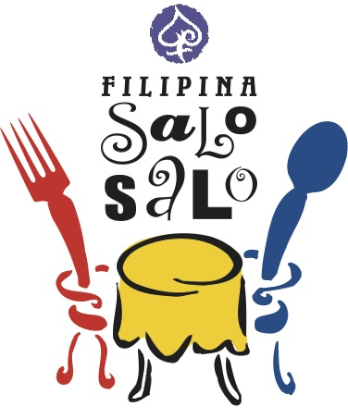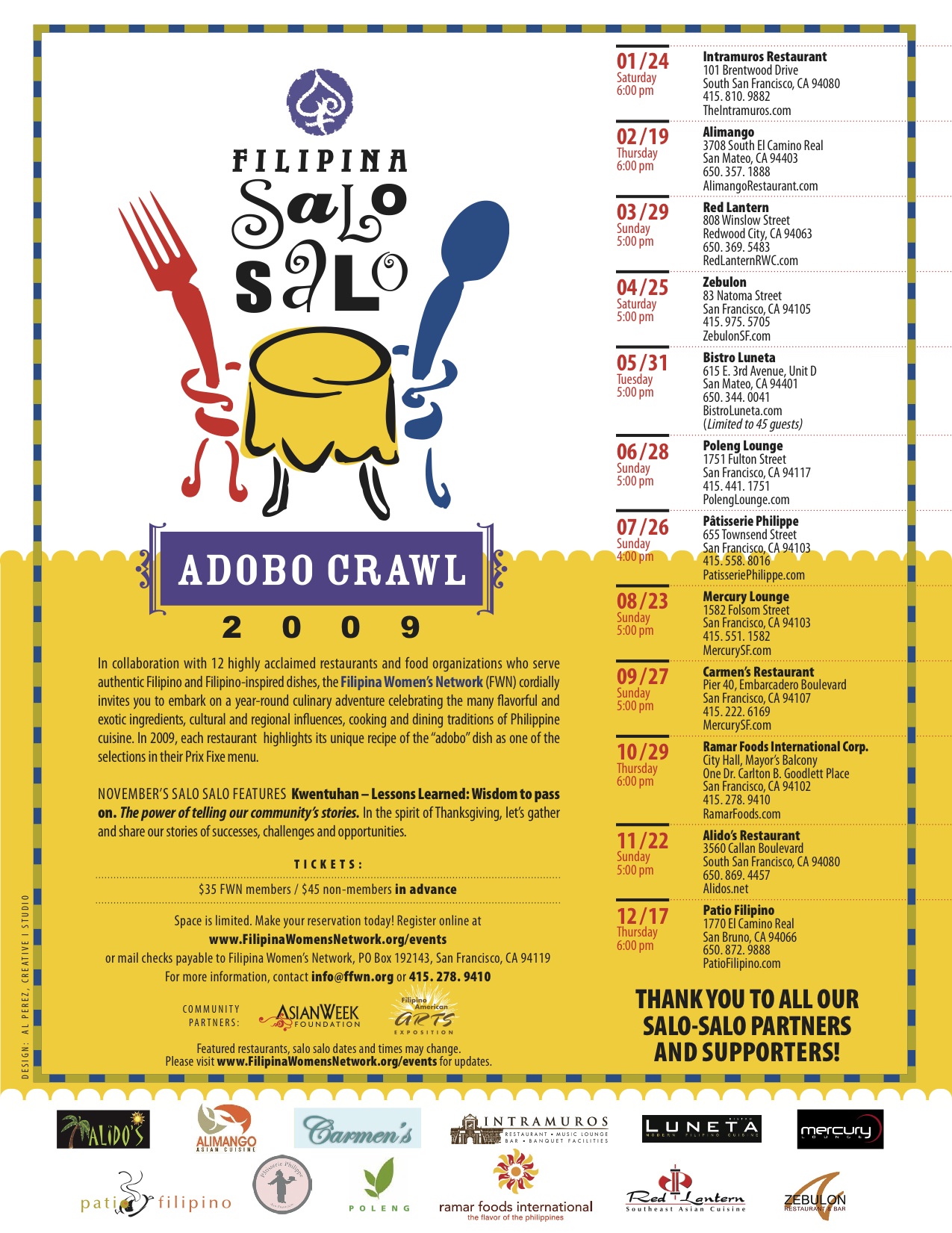- Awardee Portal
- Archives
- FILIPINA SALO SALO
- 2009 Adobo Crawl

FWN's 1st Annual Filipina Salo Salo
The 2009 Adobo Crawl
A celebration of Filipino heritage and cuisine
In collaboration with 12 highly acclaimed restaurants and food organizations who serve authentic Filipino and Filipino-inspired dishes, the Filipina Women's Network (FWN) cordially invites you to embark on a year-round culinary adventure celebrating the many flavorful and exotic ingredients, cultural and regional influences, cooking and dining traditions of Filipino cuisine.
In 2009, each restaurant highlights its unique recipe of the popular "adobo" dish as one of the selections in their Prix Fixe menu.
With over 7,000 islands making up the Philippine Archipelago and the cultural influences from Southeast Asia, China, Europe (Spain) and the Americas (Mexico, the USA), food has become the lifeblood that unites Filipinos.
This exciting amalgamation of cultural flavors inspired the Filipina Women's Network to create the
1st Annual Filipina Salo Salo — a year-long culinary adventure to explore and appreciate Filipino heritage and cuisine.
The Adobo "Crawl"
The term "crawl" has been in use since the late 19th century in European cities to describe an informal tour of pubs, bars, or restaurants that act as social gatherings for the local expat communities and tourists to meet new friends and being introduced to  new places in a strange city.
new places in a strange city.
Other crawl variations include the Santa Claus crawl (before the Christmas season), zombie crawl (Halloween) and beer/gin crawls (St. Patrick's Day). In 2009, we will re-discover the popular "adobo" dish.
Each month, as we visit a highly acclaimed restaurant, each chef will feature a pre-fixed menu (with three entree selections) highlighting their own unique interpretation of the "adobo".
 new places in a strange city.
new places in a strange city. Other crawl variations include the Santa Claus crawl (before the Christmas season), zombie crawl (Halloween) and beer/gin crawls (St. Patrick's Day). In 2009, we will re-discover the popular "adobo" dish.
Each month, as we visit a highly acclaimed restaurant, each chef will feature a pre-fixed menu (with three entree selections) highlighting their own unique interpretation of the "adobo".
Why Salo Salo?**
Salo-salo (also spelled salu-salo) is the act of sharing a meal together, to share life, and deepen friendships. Filipinos also use salo-salo as a term for 'celebration'. 'May munting salo-salo po' (We have a small celebration). We will eat together as a way of celebrating. In this instance, we are celebrating Filipino cuisine and dining practices.
Salo Salo is not only for celebrations. 'Salo' means to share a plate: 'Salo na tayo dito' or 'Let's eat from the same plate' - either there is no more plate, or sharing a plate among friends. For indeed, when one wants to share a problem with a friend, they eat together. We also say 'Pagsaluhan na natin ito' - 'Let us share with one another whatever is available. Even if it is only a small amount of food, it will suffice for all of us.' Yes, during difficult economic times, nagsasalu-salo ang mga Pinoy. Salo salo happens - a cultural energy that invigorates families and communities.
Salo Salo is not only for celebrations. 'Salo' means to share a plate: 'Salo na tayo dito' or 'Let's eat from the same plate' - either there is no more plate, or sharing a plate among friends. For indeed, when one wants to share a problem with a friend, they eat together. We also say 'Pagsaluhan na natin ito' - 'Let us share with one another whatever is available. Even if it is only a small amount of food, it will suffice for all of us.' Yes, during difficult economic times, nagsasalu-salo ang mga Pinoy. Salo salo happens - a cultural energy that invigorates families and communities.
Filipino Values**
Salo salo exemplifies the Filipino core value of pakikipagkapwa (Enriquez:1992), highlighting the 'relational' cultural ethos of the Filipino. A Filipino's life is defined by her/his relationships. Therefore, we cannot turn away someone who is in need because the other is 'kapwa'. Especially when it comes to food. Filipinos offer food as a way of greeting a friend or even a stranger.
Salo salo brings out the openness and hospitality of the Filipino. Among our indigenous tribes, sharing a meal together is also a sign of reconciliation, forgiveness, a deeper level of sharing or involvement.
Beyond sharing a meal, 'makisalo' (verb) can be translated simply as sharing, to share, to join. 'Makisalo ka naman sa amin' or 'Share (yourself) with us'. It can also mean a deeper level of sharing which is involvement or volunteering. 'Ayaw niyang makisalo sa ating gawain' or S/he does not want to get involved with our project, group or organization.'
During these uncertain times, be among friends and colleagues and join us for a friendly meal.
Salo salo brings out the openness and hospitality of the Filipino. Among our indigenous tribes, sharing a meal together is also a sign of reconciliation, forgiveness, a deeper level of sharing or involvement.
Beyond sharing a meal, 'makisalo' (verb) can be translated simply as sharing, to share, to join. 'Makisalo ka naman sa amin' or 'Share (yourself) with us'. It can also mean a deeper level of sharing which is involvement or volunteering. 'Ayaw niyang makisalo sa ating gawain' or S/he does not want to get involved with our project, group or organization.'
During these uncertain times, be among friends and colleagues and join us for a friendly meal.
Click! to join us and save your seat now.
Glorious Filipino food. Dine in style.
Meet and network with Filipina professionals.
Mabuhay!
Jennifer Ong, OD and Michelle Caabay Brokstein
Co-Chairs, Filipina Salo Salo Campaign
Sonia Delen, Dr. Valerie de Leon, Al S. Perez,
Genevieve Dwyer, Pearl Bayot, Franklin M. Ricarte,
Jo-Ann Agcaoili, Don Cain, Genevieve Herreria
Committee Members
Marily Mondejar
President, Filipina Women's Network
Glorious Filipino food. Dine in style.
Meet and network with Filipina professionals.
Mabuhay!
Jennifer Ong, OD and Michelle Caabay Brokstein
Co-Chairs, Filipina Salo Salo Campaign
Sonia Delen, Dr. Valerie de Leon, Al S. Perez,
Genevieve Dwyer, Pearl Bayot, Franklin M. Ricarte,
Jo-Ann Agcaoili, Don Cain, Genevieve Herreria
Committee Members
Marily Mondejar
President, Filipina Women's Network
** from Bukal ng Tipan
***Featured restaurants, salo salo dates and times may change. Please visit filipinawomensnetwork.org/events for updates.

